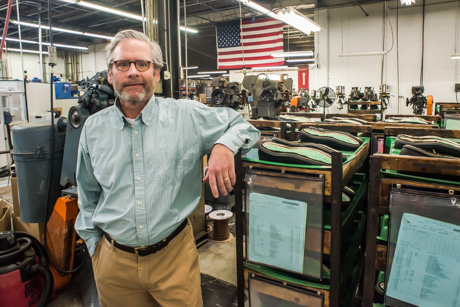
Under new ownership, Batavia's oldest company is going to get lean.
That doesn't mean layoffs at P.W. Minor. Far from it. It means implementing a process of production that eliminates waste and increases productivity.
"Lean manufacturing is nothing fancy at all, but it is a set of fundamentals that if you follow them you know your production will go way up," said Hundley Elliotte, the new CEO of P.W. Minor. "It has been proven time and time again. It's not the solution to all problems but when you're in a challenging manufacturing environment and you have price pressures and cost pressures and all those kinds of things, lean is a very good way to root out waste and boost productivity."
Elliotte is a partner with Tidewater + Associates, the investment company that acquired P.W. Minor from Pete Zeliff earlier this month. Zeliff and then-partner Andrew Young saved P.W. Minor from certain closure in 2014. More than 100 jobs that were outsourced to China were returned to Batavia as a result and Zeliff instituted a program of equipment upgrades to the plant, including increasing automation.
Tidewater's acquisition of the company, Elliotte said, is just the next step in a process of growing the company, Elliotte said during an interview with The Batavian this morning.
There's no plan to cut the workforce, move the production out of Batavia, or do anything other than grow, Elliotte said.
"We felt like there was something powerful here in the fact that this company has been here for so long," Elliotte said. "I think you bring bad luck and find yourself in a bad spot when you break up something like that. It's almost like firing a legacy coach. You know when you watch it happen, whether it's Bobby Knight or Bear Bryant, or whomever, when they leave it's always a void. You know it's hard to pick up the momentum again."
The reception to the transition, which took place at the beginning of the month, seems to have been positive among employees, Elliotte said.
"We felt like the response was very positive and I think everyone knows this has been a journey and there's still some journey left," Elliotte said. "There's still choppy waters out there. We have to work hard. We have to get better. We hope to get better every day but I think I think everyone's bought into that.
It's only been a week since the lean manufacturing process was introduced and it hasn't spread yet throughout the entire organization but already there are charts on boards that provide employees with metrics to measure their performance.
Employees are also being trained on processes that will boost productivity.
An example shared by Elliotte was establishing a process for getting a machine ready for production before the next shift so when the shift starts, production can ramp up quickly.
"It's just about getting that discipline of how we operate and making clear who has responsibility for what and making sure that it's done, so that when the machine is supposed to be running you know it's running," Elliotte said.
The process of tracking and measurement helps motivate employees to meet goals, he said.
"Everybody wants to do a good job," he said.
To help keep these jobs in the United States, Empire State Development provided P.W. Minor with an incentive package and the Local Gateway Development Corp. provided the company with a loan. Zeliff said as part of the acquisition deal he is personally paying off the loan.
Tidewater was attracted to P.W. Minor as an acquisition target because it already fits the profile of the kind of companies the investors like in their portfolio -- sustainability and promoting U.S.-based jobs.
The welt constructed by Goodyear Tire & Rubber Company for P.W. Minor boots, for example, means they will last a long time. That's good for the environment, Elliotte said.
He would like to see the Batavia plant eventually become sustainability certified. It's what consumer surveys and buying preferences say a large portion of the market wants, Elliotte said, and financially there is little reason for a company like P.W. Minor not to pursue that course.
"I'm not necessarily a big environmentalist but we all care about the planet," Elliotte said. "There are other things we can do. You know course A is better than course B and you know each of them has the same kind of financial outcome; course A is much more sustainable so do that.
"It's something that people care about," Elliotte said. "It's not that it has to overwhelm the business, but if you can run the business that way, every day make yourself more environmentally sustainable, that's a good thing, right?"
He said Tidewater is also committed to creating and sustaining U.S.-based jobs.
"There's no reason for P.W. Minor to go away and just to make all those boots in China," Elliotte said. "I understand that it makes sense in certain situations where you have you know a lower price point shoes or things like that, but there's no reason not to make boots that retail at $250, $300, or $400 in the United States. That's kind of where we've drawn the line and are trying to do our part to keep those jobs here."
